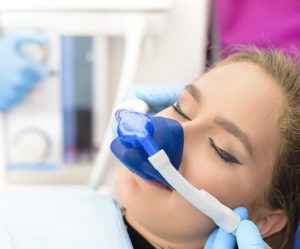 Do your palms sweat when it’s time to visit the dentist? Maybe you’re worried about a painful dental procedure? No matter the reason, you may be a candidate for sedation dentistry. Contrary to common belief, you aren’t “put to sleep,” depending on the type used. You have many sedatives to choose from based on your needs and preferences. Here’s what you can expect it to feel like with each solution for sedation dentistry.
Do your palms sweat when it’s time to visit the dentist? Maybe you’re worried about a painful dental procedure? No matter the reason, you may be a candidate for sedation dentistry. Contrary to common belief, you aren’t “put to sleep,” depending on the type used. You have many sedatives to choose from based on your needs and preferences. Here’s what you can expect it to feel like with each solution for sedation dentistry.
Nitrous Oxide
Nitrous oxide, better known as “laughing gas,” is the safest option for most patients. It’s an inhaled sedative that’s mixed with oxygen, which takes effect almost immediately and dissipates just as quickly.
Patients report feeling a warm, tingling sensation in their extremities while anxieties fade away until they reach a deep level of relaxation. You’ll remain conscious and alert, but don’t be surprised if you doze off for a short nap.
Your dentist may also use a local numbing agent to block any pain signals. While the effects of nitrous oxide won’t linger, it can take a few hours for any numbing agents to wear off.
Oral Conscious
Oral conscious sedation involves a prescribed medication that’s taken before your appointment. As the effects kick in, you won’t have any fear or anxiety. It’s not uncommon to fall asleep, but you can be awakened easily to respond to your dental team’s instructions. Oral conscious sedation can cause memory loss effects, which is great if you’ve had a past negative dental experience.
It can take a few hours for the sedative to wear off, so you’ll need a friend or loved one to drive you home. Your dentist will also recommend taking it easy for the rest of the day and avoiding making any important decisions.
IV Sedation
IV sedation is reserved for patients with complex treatment plans. The sedative is delivered intravenously, allowing it to take effect quickly and giving your dentist greater control over the amount that’s administered. Although you’ll fall asleep, you won’t be unconscious. However, you won’t feel any pain and you won’t remember much of your appointment.
After the sedative is stopped, you’ll be groggy for a few hours. Your dentist will recommend resting for the remainder of the day. You may have additional aftercare instructions as well, depending on your treatment plan, like limiting your activities.
Which Sedation is Right for You?
Sedation dentistry is safe for most patients with good general health; however, your dentist will review your medical history and any medications you’re taking to ensure there are minimal risk factors for complications. You won’t have to worry about a painful or stressful day in the dentist’s chair with dental sedation.
About Dr. James Candon
Dr. Candon earned his dental degree at the University of Maryland School of Dentistry and has continued his education in many advanced services, like sedation dentistry. Whether you’re anxious about visiting the dentist or you need dental work, he can help. Contact our office through our website or call (803) 219-8684 to request an appointment.
